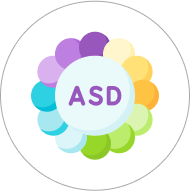Basic Information
Sleep dysfunctions are common in children with autism spectrum disorder (ASD), and these sleep disturbances may have a bidirectional relationship with autism symptoms. Sleep problems can exacerbate core autism traits, and the underlying neurobiology of autism can make sleep more difficult. Here are key ways sleep dysfunctions in children relate to or contribute to autism:
- Neurological and Genetic Overlaps
- Melatonin Dysregulation
- Hyperarousal and Sensory Sensitivities
- Social Communication Deficits and Sleep Problems
- Gastrointestinal Issues and Sleep Disruptions
- Behavioral and Developmental Impact
- Increased Risk for Co-Occurring Conditions
- Effect on Daytime Functioning and Quality of Life
Addressing sleep dysfunctions early on, whether through behavioral interventions, melatonin supplementation, or therapies like cognitive-behavioral therapy for insomnia (CBT-I), can significantly improve both sleep and daytime functioning for children with autism, helping to alleviate some core symptoms of the disorder.
Additional Information
Sleep dysfunctions are common in children with autism spectrum disorder (ASD), and these sleep disturbances may have a bidirectional relationship with autism symptoms. Sleep problems can exacerbate core autism traits, and the underlying neurobiology of autism can make sleep more difficult. Here are key ways sleep dysfunctions in children relate to or contribute to autism:
1. Neurological and Genetic Overlaps
- Neurodevelopmental Differences: Children with autism often have differences in brain regions that regulate sleep, such as the hypothalamus, which controls circadian rhythms. These differences can lead to problems falling asleep, staying asleep, or waking too early.
- Genetic Links: Genetic mutations associated with autism, such as those involving the SHANK3 or MECP2 genes, have been linked to both autism and sleep dysfunctions. These genes play roles in regulating the sleep-wake cycle and synaptic activity, contributing to the high prevalence of sleep problems in children with ASD.
2. Melatonin Dysregulation
- Reduced Melatonin Production: Many children with autism have abnormal melatonin levels, the hormone responsible for regulating sleep-wake cycles. Melatonin production may be delayed, reduced, or follow an irregular pattern, leading to difficulties in falling asleep and maintaining sleep.
- Circadian Rhythm Disturbances: Children with autism often have altered circadian rhythms, which may delay their sleep onset or disrupt their ability to maintain consistent sleep patterns. This misalignment of their internal clock can lead to chronic sleep problems and impact overall functioning.
3. Hyperarousal and Sensory Sensitivities
- Heightened Sensory Sensitivity: Many children with autism experience heightened sensory sensitivity, which can make it difficult for them to wind down and fall asleep. Sensitivity to lights, sounds, textures, or even minor changes in routine can interfere with the ability to relax, leading to sleep difficulties.
- Hyperarousal and Anxiety: Children with autism may experience hyperarousal, meaning their nervous system is in a heightened state of alertness, even at bedtime. This can cause restlessness and difficulty falling asleep, as well as frequent night awakenings.
4. Social Communication Deficits and Sleep Problems
- Communication Challenges: Many children with autism struggle with communication, which can make it difficult for them to express their discomfort or anxiety about sleep, leading to undiagnosed or unresolved sleep problems. They may also have trouble understanding bedtime routines and cues that promote healthy sleep habits.
- Difficulty Understanding Social Cues: Children with ASD may struggle to pick up on social and environmental cues that signal bedtime, such as dimming lights, quiet time, or changes in household activity, further contributing to irregular sleep patterns.
5. Gastrointestinal Issues and Sleep Disruptions
- GI Problems: Many children with autism experience gastrointestinal problems, such as constipation, acid reflux, or food sensitivities. These issues can cause physical discomfort that interrupts sleep or makes falling asleep difficult. Pain or discomfort during the night often leads to nighttime waking and poor sleep quality.
- Impact on Overall Behavior: Poor sleep linked to GI disturbances can exacerbate the behavioral symptoms of autism, such as irritability, repetitive behaviors, and difficulty with social interaction.
6. Behavioral and Developmental Impact
- Sleep Deprivation and Behavior: Sleep dysfunctions in children with autism can worsen behavioral challenges, such as hyperactivity, aggression, and difficulty concentrating. Sleep deprivation can magnify core autism traits, making symptoms more intense and harder to manage during the day.
- Cognitive and Language Development: Chronic sleep problems can impair cognitive function, language development, and memory in children with autism. Poor sleep may interfere with their ability to learn new skills, leading to delays in speech, language, and other developmental milestones.
7. Increased Risk for Co-Occurring Conditions
- ADHD and Anxiety: Many children with autism have co-occurring conditions such as attention-deficit/hyperactivity disorder (ADHD) and anxiety, both of which are associated with sleep dysfunctions. These conditions can make it harder for children to relax and follow regular sleep schedules.
- Epilepsy and Sleep Disturbances: Children with autism are at a higher risk for epilepsy, which is often associated with sleep disruptions. Seizures or the medications used to manage epilepsy can interfere with sleep patterns and exacerbate the symptoms of autism.
8. Effect on Daytime Functioning and Quality of Life
- Emotional Regulation: Sleep deprivation can worsen emotional regulation difficulties in children with autism. Poor sleep may increase irritability, anxiety, and difficulty managing emotions, making it harder for them to engage in social interactions and cope with changes in their environment.
- Parent-Child Sleep Interactions: Sleep problems in children with autism can disrupt family life, as many parents must spend extra time managing their child’s sleep issues. This can create stress and affect the quality of interactions between the child and their caregivers.
Addressing sleep dysfunctions early on, whether through behavioral interventions, melatonin supplementation, or therapies like cognitive-behavioral therapy for insomnia (CBT-I), can significantly improve both sleep and daytime functioning for children with autism, helping to alleviate some core symptoms of the disorder.

